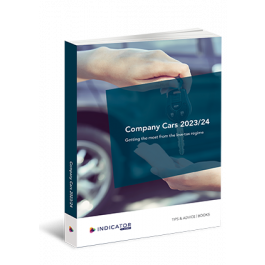Company Cars 2023/24
Getting the most from the low-tax regime
A Tips & Advice Special Report about...
In a nutshell
This Special Report ensures that you make the most tax-efficient choice when it comes to buying or leasing a company vehicle. We look in detail at the zero and low tax charge for hybrid and electric cars, analyse the pros and cons of the benefit in kind regime and give you the heads-up on all the other tax consequences. In this Special Report we cover all the information you need to minimise the tax bill and maximise the benefits of a company vehicle. Use it to get the most from the current and evolving company car tax regime.
In detail
Company cars continue to be a popular benefit in kind for employees and directors, but they come with a tax cost. And while the tax regime offers big incentives for electric cars, other factors can affect the tax cost significantly. This Special Report considers all the issues that can affect company car tax, such as:
- Paying for fuel for private journeys
- The electric-only range of hybrid cars
- CO2 emissions on capital allowances
- Cars as perks or tools of the trade
- Choosing a car-derived van
- RDE2 compliant or non-compliant diesel cars
- Car or van sharing
- Tax-free pool cars
- Mileage allowances
There’s so much more involved than simply choosing between electric and fossil fuel powered cars and vans. With this Special Report, you’ll get the full picture plus all the need-to-know details, tips and traps to look out for. By taking account of all the latest tax rules, you'll be able to select the right car for you or your company with the minimum possible tax cost.
We've created this Tips & Advice Special Report especially for...
Accountants and tax advisors, company owners and car drivers that want to:
- Get the most from the current company car tax regime
- Understand the rules moving forward
You'll get the following free extras with this Tips & Advice Special Report...
An online service with ready-to-use documents
- To immediately apply our advice and solutions in practice
- That you can easily adapt to suit your own requirements
In this Tips & Advice Special Report you'll read about...
1. Using this Report to save tax
1.1. Tax is now a key factor in choosing a company car
1.2. How do you get the most from the current company car tax regime?
2. Cars and vans - tax treatment at a glance
2.1. Tax deductions for costs
2.2. Tax charges for private use
3. Choosing a company car - the tax and NI implications
3.1. What factors are used to work out company car tax and NI?
3.2. What’s the maximum taxable amount of car benefit?
3.3. How does fuel type affect the tax bill?
3.4. How long will the low tax incentive for electric and hybrid cars apply?
3.5. BEV
3.6. Hybrid
3.7. Petrol
3.8. Diesel (not RDE2)
3.9. Does the age of the car affect tax and NI bills?
3.10. Where can I find the CO2 figures?
3.11. How is the tax calculated?
3.12. Notes
3.13. How do accessories affect the tax charge?
3.14. Does the calculation take account of special factors?
3.15. What are classic cars and how is the car benefit calculated?
3.16. How is the car benefit worked out for older cars and those without an emissions figure?
3.17. What are company “pool cars”?
3.18. What counts as an incidental journey?
3.19. What’s the tax position for a second or subsequent car?
4. Choosing a company van - the tax and NI implications
4.1. Should a van be considered instead of a car?
4.2. What’s the difference between a car and a van?
4.3. What’s the taxable amount for private use of a company van?
4.4. What are the exemptions?
4.5. Examples of insignificant use
4.6. Examples of use which is NOT insignificant
4.7. Is there a tax charge for fuel for vans?
4.8. Is there a lower tax charge for electric vans?
5. Car fuel
5.1. How is the car fuel benefit amount worked out?
5.2. Is there a car fuel benefit for electric cars?
5.3. When is a company car fuel benefit charge triggered?
5.4. How can the car fuel benefit charge be avoided?
5.5. How is the “making good” amount worked out?
5.6. Are there other conditions for making good?
5.7. What if the employee pays for fuel used for business journeys?
5.8. What’s the position if a business pays for charging an electric car for private mileage?
6. VAT
6.1. What makes a vehicle a car for VAT purposes?
6.2. How does VAT affect company cars?
6.3. Do we have to charge VAT when we sell a company car?
6.4. Can VAT paid on running costs be reclaimed?
6.5. What are the rules for reclaiming VAT on car fuel?
6.6. Can VAT be reclaimed on the cost of car accessories?
6.7. Are there any VAT consequences of using a company car for private journeys?
6.8. Are there any VAT consequences of using a company van for private journeys?
6.9. What are the rules for leased cars?
7. Company car costs
7.1. What are the general rules for tax deductions?
7.2. How are capital allowances calculated?
7.3. How can capital allowances be accelerated?
7.4. How are tax deductions given for rented or leased cars?
7.5. What type of contracts do the lease rules apply to?
7.6. Are there tax deductions for other costs of buying a car?
7.7. What’s the tax position when a company car is sold or a lease ends?
8. Privately owned cars and business use
8.1. What is a mileage allowance payment?
8.2. What is an authorised mileage allowance payment?
8.3. How are MAPs made?
8.4. What’s the maximum allowance that can be paid?
8.5. Is a mileage allowance tax deductible?
8.6. What’s the tax position for MAPs?
8.7. Can an extra mileage allowance be paid for passengers?
8.8. Should MAPs be declared on personal tax returns?
8.9. Can a tax deduction be claimed where MAPs are received?
8.10. Are there any VAT consequences related to MAPs?
8.11. How do mileage allowances work for the self-employed and business partners?
9. Miscellaneous tax issues for cars
9.1. Can we use a salary sacrifice arrangement for a company car?
9.2. How do OpRAs work?
9.3. Is paying for parking a taxable benefit in kind?
9.4. An employee has incurred a parking fine. What’s the tax position if we pay it?
9.5. What about speeding fines?
9.6. Can any tax-free mileage allowances be paid to company car drivers?
9.7. How should employees claim a tax deduction for business mileage?
9.8. Is the cost of a personalised registration number tax deductible?
9.9. What about the VAT on a personalised number plate?
9.10. Does a personalised number plate count as a benefit in kind?
10. Appendices
10.1. Appendix A - Company car taxable benefit amount
10.2. Appendix B - Annual taxable benefit versus taxable benefit for transfer of car
10.3. Appendix C - Tax on car accessories which are part of the main company car tax calculation
10.4. Appendix D - Capital allowances for company cars
10.5. Appendix E - Accelerating capital allowances for cars
10.6. Appendix F - Flat rate for mileage
10.7. Appendix G - Tax deductibility of parking fines levied by businesses and private landowners
10.8. Appendix H - Vehicle excise duty from 1 April 2023
You can choose from the following options...
Paper
- The hard copy version
- Keep it on your desk or use it whenever you're offline
Digital
- The PDF-version
- Delivered to your inbox
Take a look at your options below.
Special subscribers' offer
£90.00
£70.00
Only if you already have a subscriptionStandard offer
£90.00
Special subscribers' offer
£90.00
£70.00
Only if you already have a subscriptionStandard offer
£90.00

Got a question? Call Customer Services
(01233) 653500


 (01233) 653500
(01233) 653500 







